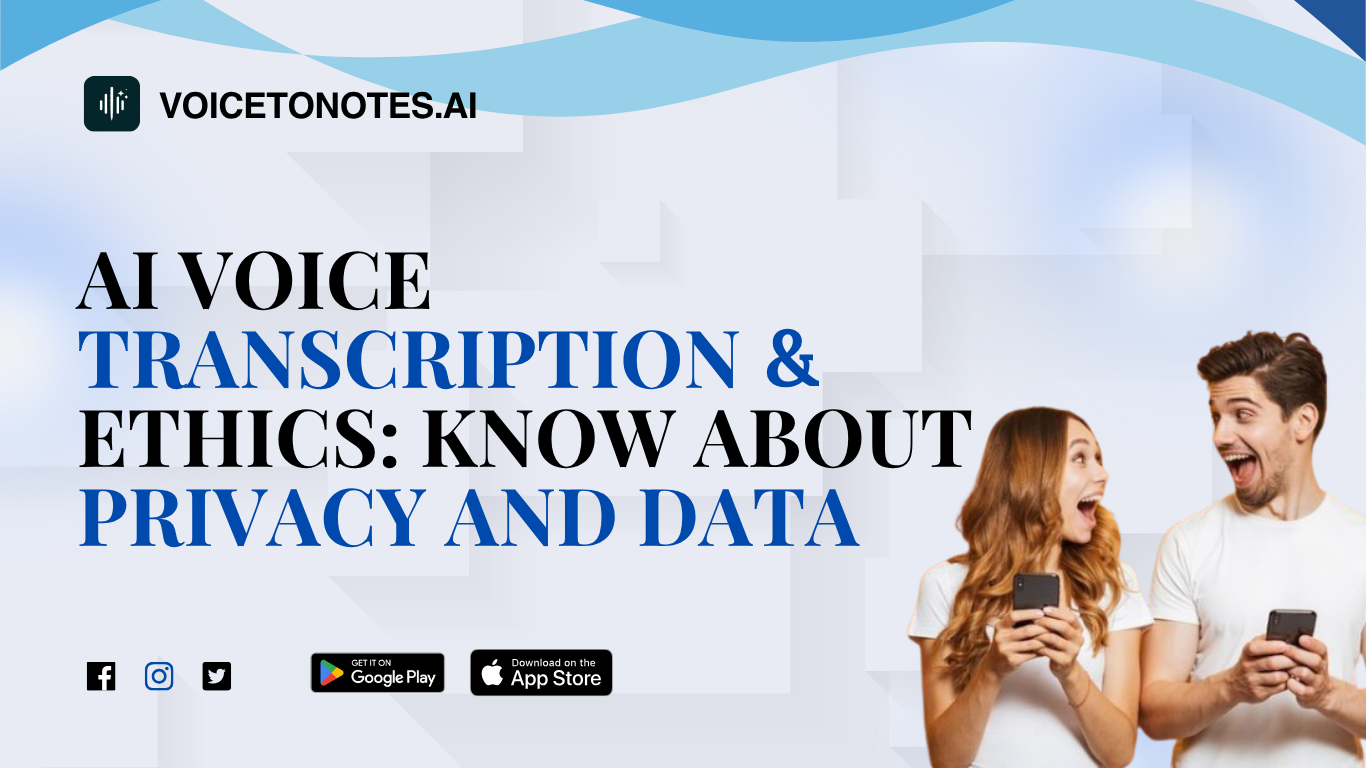
Act as if you're speaking into your phone and telling it to record your thoughts, appointments, or even doctor's notes.
In the blink of an eye, an artificial intelligence platform records your voice. What happens to the voice data afterwards? Who does it belong to, and is it protected?
With the growing usage of AI to transcribe sensitive data in such areas as healthcare, law, and customer service, ethical concerns are at the forefront of the agenda.
In this blog, we examine the most pressing ethical concerns regarding AI voice transcription, why they matter, and what companies need to consider to develop an ethical AI future.
Key Ethical Concerns of AI Voice Transcription
AI voice transcription is a revolution for most industries, but one that comes with very serious ethical concerns to be treated with caution.
These are the most important ones.
1. Privacy and Security: Protecting Confidential Information
Voice data is, by nature, sensitive since it typically consists of personal information, private messages, or confidential legal or medical information. Whatever ethical application of AI transcription is undertaken must start with the preservation of strong data privacy.
To truly understand how AI transcription works, it's important to consider how it handles not just the technology behind voice-to-text conversion, but also user trust, security, and compliance. Learn more about the ethical use of voice to notes tools and how responsible apps ensure your data stays safe.
- Data Encryption: The transcripts and recordings need to be encrypted to ensure access is limited to authorised individuals, maintaining sensitive information at every phase—from recording to storage.
- Data Protection Law: Compliance with data protection laws, such as GDPR (General Data Protection Regulation) in the European Union or HIPAA (Health Insurance Portability and Accountability Act) in the United States, is required. These laws demand strict procedures for storing, processing, and transmitting personal data, and also ensure user rights to access, correct, or delete their information.
Why it is important: Misuse of private voice data can lead to identity theft, fraud, and serious breaches of privacy. Ethical AI transcription tools must guarantee that voice data is used only for its intended purpose and stays fully secure.
2. Transparency and Consent: Guiding the Users
Transparency and consent are the pillars of any ethical framework. Users should always be fully aware if they are recorded and transcribed by an AI system.
Users can be unaware of the extent to which their voice data will be used without their express consent.
Informed Consent: The participants must be completely informed prior to recording and requested to consent to transcription.
Transparency is completely unavoidable in this situation, particularly with sensitive material such as medical history or legal advice.
User Choice: Human transcription option should be made available for individuals who are not comfortable with AI transcription, especially in highly sensitive situations.
Why it matters: When customers are unaware that they are being transcribed, it generates distrust and unease, which kills relationships with service providers.
3. Bias and Fairness: Avoiding Discriminatory Conduct
AI transcription software, if trained inadequately, can exaggerate biases in training data.
That can mean mishearing certain accents, certain dialects, or certain speech patterns typical of certain racial, gender, or cultural groups.
Varied Training Data: The best way to prevent bias is by training transcription models on different sets of data with a broad range of accents, languages, dialects, and speech patterns.
Regular Audits: There must be regular audits and tests to check AI systems for bias and fair treatment to all sections. This can be achieved by cross-verifying the accuracy of transcription region-wise and speech type-wise.
Why it matters: When AI systems are trained on unrepresentative data sets, they are most likely to produce erroneous or biased transcriptions, especially of non-native speakers or different accents. This will result in discrimination and social inequality.
That’s why using a secure voice to notes AI platform like VoiceToNotes — one that prioritizes fairness, privacy, and accountability — is essential for ethical and inclusive voice transcription.
4. Accuracy and Accountability: Ensuring Consistent Results
AI transcription is not perfect.
Transcription errors, particularly in sensitive fields such as medicine or law, are very costly. So accountability within the process is crucial. Discover how to transcribe your own voice memos accurately for free.
Human Review: High-stakes settings such as medical transcription or legal transcription require human review so that the transcriptions produced by AI are accurate and dependable.
Real-Time Marking of Errors: There should be real-time marking and detection of errors in transcription. Users should also have a simple way of correcting errors or disputing transcriptions.
Real-time marking of errors: The transcription should have real-time marking and an error examination. Users should also have an easy way to correct errors or dispose of transcriptions.
Transparency in liability compositions: Companies need transparency in liability designs; users are aware of who is responsible for the accuracy of transcriptions.
Why it is important: AI transcription errors can lead to incorrect interpretation, misdiagnosis of misdemeanours and erroneous legal rulings, especially in industries where small errors have the effect of changing lives.
5. Data Retention: Dealing morally with stored data
Once the transcription is finished, the question is raised: How long will the information be maintained? Businesses need to develop policies related to how long noise information will be maintained and what happens to subsequent information.
- Retention policies: Policies should be strict on the period for which the data is being maintained and when data is destroyed or made anonymous. Maintaining data longer than the specified period increases the risk of breach and abuse.
- User Notification: Users should be informed if their voice data will be used to train AI models or future AI upgrades, and they should be given an opt-out opportunity.
To ensure full transparency and fairness, it's crucial to understand how NLP & ethical AI usage are shaping modern voice technologies. Respecting user privacy isn't just a legal requirement — it's a key part of building trust in AI systems.
Why it is important: Extreme data increases the risk of data leakage or abuse. It is also important for companies to respect users' privacy, especially in a day when individuals' data is commonly misused.
6. Incorrect information and dipfax: preventing abusive use
Increasing challenges include AI Voice Is Technology Abuse for Deepfake or Artificial Material Pay Generation.
AI can easily mimic voices, leading to unpleasant consequences such as impersonation, wrong information or crime.
Regulation and Monitoring: With the law restricting the formation of deepfakes in audio, video, or Dio, there is a need to provide proper regulation on the use of AI-generated voice material.
Moral Principles: There should be strict moral principles by artificial intelligence companies that prohibit the illegal use of their products for the production of malicious or misleading materials.
Why it is important: Deepfakes can be used for cheating, defamation and identity theft. It is noteworthy that AI voice transcription apps cannot be used for malicious purposes for the safety of the people and the benefit of trust.
Moral effects of AI vs Some industries face a higher moral risk in their requests for AI voice transcription. Think of some of these sensitive areas: law and medicine.
Legal Settings: The accuracy is highest in terms of the judiciary; transcription errors may influence court rulings or legal rulings. In this regard, the AI transcription should make a very precise and clear-cut decision.
Mandatory Human Review: Due to the effects in legal settings, AI transcripts should always be reviewed by a person before their application in court or legal documents. This is to guarantee that any error is identified and fixed.
Liability in case of error: Where there is an error, there must be sufficient methods of liability to consider the impact on the customers or the justice system.
Why it is important: False transcriptions in the courtroom have life-changing results, determining tests or the validity of a judgment.
Healthcare: It is very important to protect patients' histories or patient-therapist discussion transcription in medicine.
AI transcription errors in medicine can lead to a wrong medical history, and the results can be fatal.
Strict Security Requirements: A Healthcare AI transcription platform to ensure the secrecy of patients.
Human belief: For the life and death of medical treatment, human beliefs need to be applied to medical transcriptions to overcome any errors.
Why it is important: Incorrect diagnosis, improper treatment, and inaccurate healthcare transcriptions for suboptimal patient care are the risk factors.
FAQ
1. Who stores the voice data recorded and transcribed by AI models?
Ownership of your voice data remains with the user. It also might depend on what platform you are using and their terms of service. Ethical transcription providers clearly state rights to store, use or train their AI models. Always review the privacy policies of platforms to ensure your data isn’t misused without consent.
2. How secure is AI transcription?
Most AI transcription services use end-to-end encryption and limited access controls and follow regulations like GDPR and HIPAA.
3. Do AI transcription systems misinterpret?
Yes. AI can also transcribe and provide inaccurate results with certain accents and patterns of speech if not trained well. Responsible companies conduct regular audits of models and expand their datasets to test accuracy across languages and accents.
4. Can platforms use my voice data to train models?
Yes, they do, but with the user’s consent. Ethical transcription platforms provide you with consent choices for the same. If you agree, then they use your voice data to train models and improve; otherwise, your data is only used to provide you service requested and then deleted according to the policies.
5. How does an AI transcription system prevent misuse like deepfakes?
AI transcription providers possess strong safeguards and security systems. Resist voice cloning. They comply with rules and regulations that govern the creation of synthetic audio.
6. What are the main regulations a company must follow?
Depending on your industry type, regulations must include:
- GDPR (EU): Protecting personal data.
- HIPAA (US): Regulating health-related information.
- CCPA (California): Grants access to or delete your personal data.
- Emerging AI legislation: Permits the use of synthetic media.
Before choosing a transcription platform, make sure it meets all the legal requirements.
Conclusion
AI voice transcription technologies for the future are full of ethical prospects for many industries, but they cannot be morally ignored.
Eliminating moral challenges such as privacy, consent, prejudice, precision, responsibility, and data storage can ensure that AI transcription is moral and responsible.
For businesses, it means adopting open privacy methods, delivering high-quality transcription, and presenting human observation wherever necessary.
That means respecting users' information and not allowing AI software to be used to harm or mislead others.
Playing by the rules of this morality, without compromising privacy, AI models trained for transcription can revolutionise industries like healthcare, law, customer service, and more.
Ready to transcribe with confidence?
Experience the secure, ethical, and accurately designed voice transcription app VoiceToNotes.ai. Also, compare top-rated apps in our curated list of the best voice-to-notes apps of 2025.
Get started today!


.png)